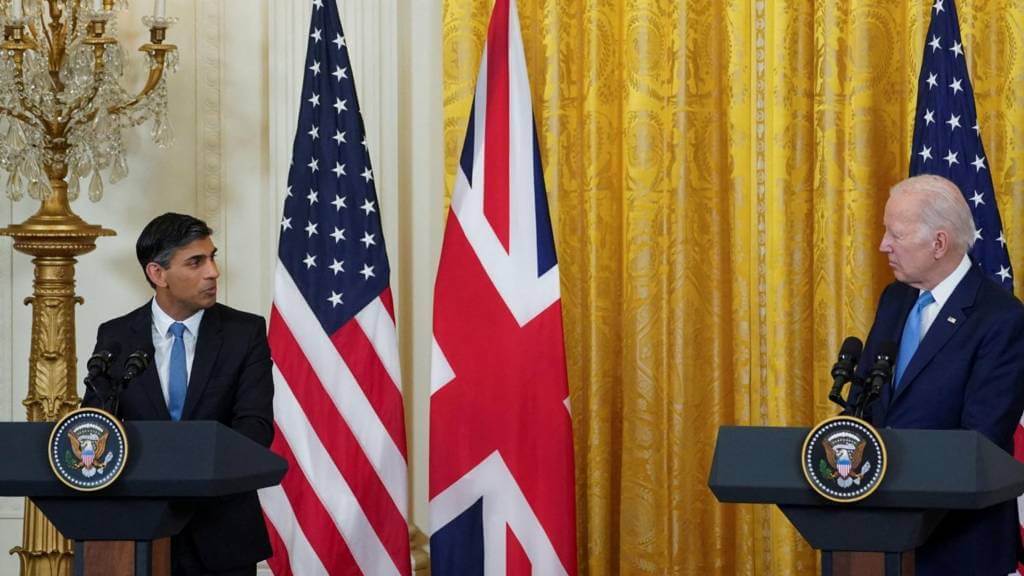On Thursday, the UK and the US signed a new “Atlantic Declaration” advocating for increased cooperation on crucial economic challenges such as clean energy, critical minerals, and artificial intelligence (AI). The partnership is referred to as the “first of its kind” in the joint declaration. It includes various economic, technological, commercial, and trade relations between the two countries.
New Age ‘Atlantic Declaration’
US President Joe Biden and British PM Rishi Sunak met in the White House on Thursday for wide-ranging discussions. The Oval Office discussions between Sunak and Biden will incorporate a scope of critical subjects, including the Ukraine conflict, China, economic security, global cooperation on the regulation of AI, and other pressing issues.
Biden and Sunak signed the Atlantic Declaration, which aims to strengthen industrial ties in defence and renewable energy in the face of growing Chinese competition.
US and UK back new 'Atlantic Declaration' for economic cooperation https://t.co/oT1yaWrfSr pic.twitter.com/yMnbQVTjWK
— Reuters (@Reuters) June 9, 2023
The declaration stated, “the nature of national security is changing. Technology, economics, and national security are more deeply intertwined than ever before. We face new challenges to international stability — from authoritarian states, such as Russia and the People’s Republic of China (PRC); disruptive technologies; non-state actors; and transnational challenges like climate change.”
The UK and US have revitalised historical allies and formed new and creative alliances based on more profound technology, trade, and security cooperation. Both countries committed to assisting Ukraine in the face of Russia’s “illegal, unjustifiable, and unprovoked act of aggression and to preserve a free, independent, and sovereign Ukraine.”
Under the plan, the UK and the US pledged to enhance cooperation in multilateral agreements like the AUKUS and Indo-Pacific Dialogue. AUKUS includes plans to assist Australia in acquiring conventionally armed, nuclear-powered submarines. Through the US-UK Indo-Pacific Dialogue, the countries aim to explore new opportunities to coordinate approaches, support ASEAN and its centrality, collaborate with the Pacific Islands, coordinate economic and technological advancement, and contribute to regional peace and stability.
Five Pillars
The Atlantic Declaration and its accompanying Action Plan provide the framework for a new type of innovative partnership across the full spectrum of economic, technological, commercial, and trade relations, a first of its kind that necessitates joint leadership.
The first step mentioned under the declaration in this new economic partnership comprises taking coordinated, concrete actions to strengthen it by implementing five pillars:
- Ensuring US-UK leadership in crucial and emerging technologies,
- Developing ever-closer cooperation on economic security, technology protection, and supply chain toolkits,
- Working on a responsible and inclusive digital transformation,
- Building the future clean energy economy, and
- Strengthening partnership in defence, health security, and space.
Tech and Energy Cooperation
Sunak and Biden also agreed to establish a new civil nuclear partnership as part of their long-term clean energy cooperation, which involves constructing new infrastructure and reducing dependency on Russian fuel.
Biden said at a joint press conference with Sunak in Washington that the US was seeking to assist Britain in leading an integrated approach to AI safety and regulation. According to the Atlantic Declaration, Britain and the US will also collaborate on telecoms technologies, such as 5G and 6G and quantum technologies.
The two countries will also start negotiations on a critical minerals deal, which would allow some UK firms to benefit from the tax credits offered under the US Inflation Reduction Act (IRA). Minerals such as lithium, nickel, cobalt, graphite, and manganese are essential for batteries used in electric cars, smartphones, and solar panels.
The declaration additionally incorporates an in-principle commitment to a UK-US “data bridge,” which would make it easier for British businesses to transfer data freely to US organisations without red tape.
The United States and Britain announced a new strategic pact as their leaders rededicated the "special relationship" to counter Russia, China and economic instabilityhttps://t.co/6wNDyURbcp
— Hindustan Times (@htTweets) June 9, 2023
Parallels to 1941 Atlantic Declaration
The Atlantic Charter was a joint proclamation issued on 14 August 1941, by former US President Franklin D. Roosevelt and British PM Winston Churchill following a meeting of the two heads of government in Newfoundland. The Atlantic Charter outlined the US and Britain’s military objectives.
The Charter incorporated “common principles” that the US and Great Britain would be committed to upholding in the post-war world. Both countries agreed not to seek territorial expansion, to pursue international trade liberalisation, to establish freedom of the seas, and to comply with international labour, economic, and welfare standards.
While the meeting effectively developed these goals, neither leader achieved the intended outcomes. Although the Atlantic Charter of August 1941 was not a legally binding treaty, it was significant for several reasons. First, it publicly announced the US and Great Britain’s alliance against Axis aggression. Second, it outlined President Roosevelt’s Wilsonian vision for the postwar world, which would be characterised by greater economic freedom, self-determination, disarmament, and collective security.

